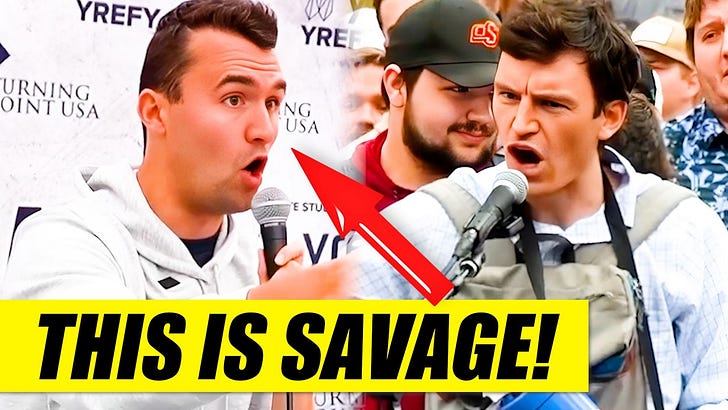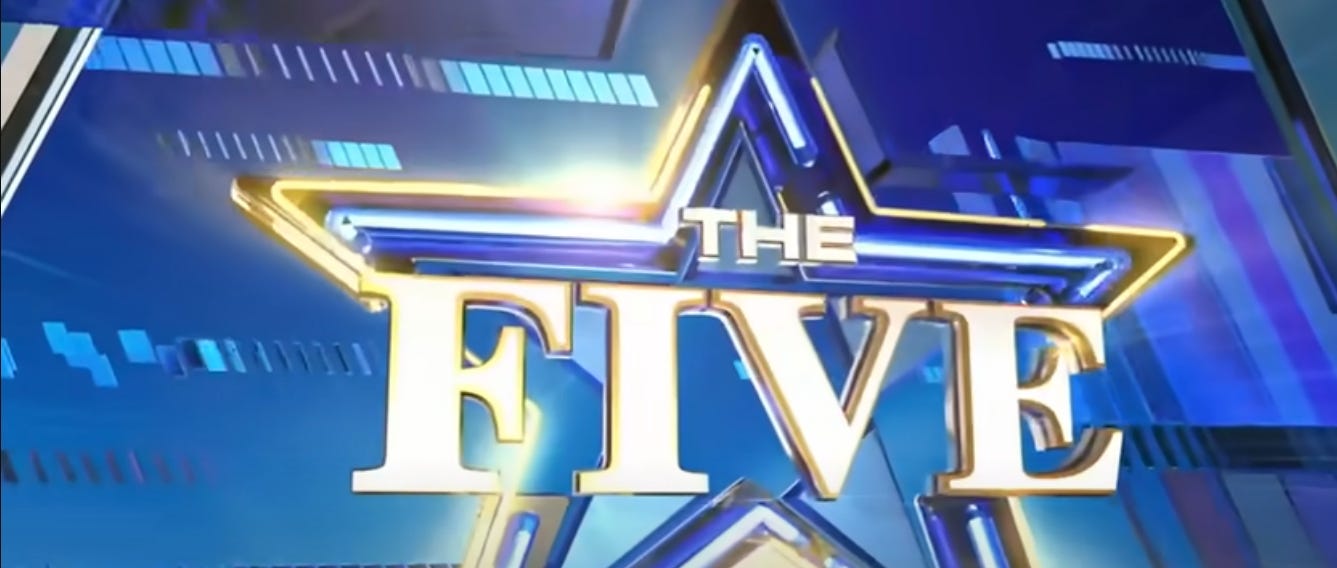
Reality Check:
That’s very dramatic framing. There have been many major governmental shifts since the American Revolution—like:
The Civil War and Reconstruction
The New Deal under FDR
The Civil Rights Movement
Post-9/11 government expansions (like the Patriot Act)
So unless this speaker is talking about something on that level (or bigger), it’s probably an exaggeration meant to hype their agenda.
💬 "AMERICA IS GOING TO BE IN MUCH BETTER SHAPE."
Reality Check:
Purely speculative. Optimistic language like this is super common in political messaging, but whether or not things will get better depends on what specific policies are being implemented—and who they benefit.
💬 "WHAT WE ARE TRYING TO DO IS ENSURE THAT PEOPLE DO RECEIVE THE BENEFITS IN THE FUTURE."
Reality Check:
Sounds like a promise to protect or reform programs like Social Security, Medicare, or unemployment—but there’s no detail here. In recent years, some politicians have floated cuts or “reforms” to benefits, so this could be spin. We'd need context on who said it and what specific policies they’re backing.
💬 "IF THE COUNTRY IS OPERATING IN A HEALTHY AND COMPETENT WAY."
Reality Check:
True in a general sense—government programs work best when the economy is strong
, and the government is run efficiently. But “healthy and competent” is vague. This could be used to justify anything from budget cuts to deregulation or privatization.
Elon Musk's claim that his work with the Department of Government Efficiency (DOGE) represents "the biggest revolution in government since the original revolution" is a bold statement that warrants careful examination. While DOGE's initiatives have led to significant changes within the federal government, including substantial budget cuts and agency restructuring, the characterization of these efforts as the most transformative since the American Revolution is subject to debate.
Scope of DOGE's Initiatives:
Budget Reductions: Musk has asserted that DOGE is achieving daily federal spending cuts of approximately $4 billion, aiming for a total reduction of $1 trillion within a 130-day period. These cuts have involved staff reductions and the elimination of certain agencies.
Agency Restructuring: One notable action includes the closure of the U.S. Agency for International Development (USAID), with its functions being absorbed by the State Department. This move was justified by cost-saving measures and a reevaluation of the agency's effectiveness.
Historical Context:
When comparing DOGE's actions to past governmental transformations, several significant events come to mind:
The Civil War and Reconstruction: Abolition of slavery and redefining federal-state relationships.
The New Deal: Introduction of extensive social welfare programs and regulatory reforms during the 1930s.
The Civil Rights Movement: Legislation in the 1960s that profoundly impacted social and political structures.
Each of these periods brought about deep and lasting changes to the U.S. government and society. While DOGE's current initiatives are substantial, it remains to be seen whether their long-term impact will be as profound.
Support: Some view the initiatives as necessary steps toward reducing government inefficiency and curbing excessive spending.
Criticism: Others argue that the rapid pace of change and significant staff reductions could lead to a "brain drain" and the loss of valuable institutional knowledge.
"WE REALLY BELIEVE THAT THE GOVERNMENT CAN HAVE AN APPLE STORE-LIKE EXPERIENCE..."
Reality Check:
He’s suggesting government services can be sleek, user-friendly, and efficient—like the idealized version of an Apple Store. That sounds good in theory. A smoother DMV experience or easier tax filing would be great. But:
Government ≠ Business: Public institutions serve everyone, not just paying customers. So what works for a profit-driven tech company doesn’t always translate.
Apple Store-like? Apple controls every aspect of their hardware, software, and customer service environment. Government agencies have to deal with outdated legacy systems, budget constraints, and accountability to the public.
💬 "...IF WE DESIGN GREAT USER EXPERIENCE IN MODERN SYSTEMS."
Reality Check:
This part is valid in principle. Better UI/UX in government platforms (like healthcare.gov, DMV sites, or benefits portals) could absolutely improve access and efficiency. But modernizing the government’s tech infrastructure is a massive, expensive, and politically complex task. Plus, simply having a “modern” interface doesn’t guarantee fair or effective service.
Bottom Line:
Musk is using Silicon Valley buzzwords to sell a vision of efficient, tech-driven government. There’s some truth to the idea that user experience in government systems could and should improve—but comparing it to an Apple Store is an oversimplified metaphor that ignores the complexity of governing a nation of 330 million diverse people.
"RETIREMENT STUFF IS STILL DONE BY PAPER...LOOKS IDENTICAL TO THE 1950s."
Reality Check:
Partially true. Some federal processes—like certain retirement benefits and legacy systems in Social Security or the Office of Personnel Management—do still rely on outdated systems, including COBOL-based software and physical documents.
BUT: Many parts have also been digitized. Saying it’s identical to the 1950s is hyperbolic. It’s more like “still way behind modern standards.”
💬 "SNAPSHOT OF THE MIND...LOOKS THE SAME."
Likely meant to say something like "snapshot of the system" or "mindset"—a jumbled metaphor. It’s vague and sounds like a glitchy AI trying to say “the system hasn’t changed mentally or structurally since the '50s.”
💬 "WASTEFUL SPENDING...WASTE AND FRAUD...IS MIND-BLOWING."
Reality Check:
Fraud and waste in federal programs do exist, especially in areas like:
COVID relief programs (PPP loans, etc.)
Medicare/Medicaid billing fraud
Unemployment insurance fraud during the pandemic
But politicians and billionaires love to inflate these numbers to justify cuts or privatization. So while fraud is a legit issue, we have to be skeptical of how it's framed.
💬 "700 I.T. STATIONS. SOFTWARE SYSTEMS. THEY CAN’T SPEAK TO EACH OTHER."
Reality Check:
True problem. Government agencies often use siloed, outdated tech that doesn’t integrate well. Interoperability is a huge challenge.
💬 "40% OF THE PHONE CALLS...ARE FROM FRAUDSTERS."
Big Claim. No source cited, so take this with a grain of salt.
It could refer to robocalls and phishing attempts to government hotlines (like IRS scams).
But 40% is a giant figure—sounds cherry-picked or exaggerated unless verified.
💬 "OVER 300 MILLION TO PEOPLE OVER AGE 120."
That sounds like another inflated fraud stat. Could be referencing a single audit or report showing benefits being sent to deceased people due to outdated databases (which has happened). But saying it like 300M is an ongoing pattern is misleading unless proven.
Also:
Oldest living American is around 114. So yes, anyone listed as 120+ is either a fraud case or a data error.
💬 "SMALL BUSINESS LOANS" being fraudulently claimed.
True. During COVID, a lot of PPP loans and EIDL loans were issued with very little verification. Billions were scammed. That’s real.
Final Verdict:
✅ Truth:
Government IT systems are outdated and fragmented.
Fraud and waste do exist, especially during emergency funding periods.
Some benefit systems still rely on paper and legacy tech.
❌ Exaggeration / Spin:
40% fraud calls? No citation.
300M to 120-year-olds? Probably one-time audit data, not ongoing fraud.
"Biggest revolution since 1776"? Come on.
"A PEACEFUL COMPANY THAT...HASN'T HARMED ANYONE."
Reality Check:
Tesla has undeniably made impactful electric vehicles and advanced renewable tech. But the idea that it “hasn’t harmed anyone” is misleading:
Tesla has been accused of:
Union-busting (NLRB found unlawful retaliation)
Worker safety issues (injuries in factories, underreporting)
Racial discrimination lawsuits (e.g., $3.2M awarded in 2023)
Autopilot-related crashes and deaths
So, not exactly harm-free.
💬 "PEOPLE ARE COMMITTING VIOLENCE...FIREBOMBING TESLA DEALERSHIPS."
Reality Check:
This is a serious claim—and if true, there should be police reports and major news coverage. As of now, no verified, widespread firebombing incidents at Tesla dealerships have been reported publicly.
If this happened recently, it may be isolated, not part of a trend. But it’s being framed like an ideological wave of terrorism, which could be a narrative weapon rather than a factual one.
💬 "THEY ARE ISSUING DEATH THREATS...AGAINST ME AND OTHER TESLA PERSONNEL."
Reality Check:
Unfortunately, public figures—especially polarizing ones—do receive threats. Elon has mentioned this before, and it’s likely true to some extent. But again, he’s linking this to a broad political enemy (“the far left”) without clear proof.
💬 "THEY ARE BEING FED PROPAGANDA BY THE FAR LEFT."
Reality Check:
This is a political framing tool: blaming unrest or criticism on ideological manipulation. There’s no evidence presented here—just a generalized accusation.
Musk often positions himself as a free speech martyr or target of the “woke mob” to rally support. It’s strategic rhetoric, not a balanced analysis.
⚖️ Summary:
CLAIM REALITY
Tesla makes great cars
✅ Fair opinion for many people
Tesla is peaceful / harm-free
❌ Disputed due to legal and ethical controversies
Firebombing/shootings
🚨 No confirmed reports—needs verification
Death threats
😬 Probably some truth, but common among high-profile figures
Far-left propaganda causing violence
❌ No evidence provided—just speculative political blame
Main Narrative Summary:
This speaker (likely from a right-wing media show) is:
Praising the DOGE (Department of Government Efficiency) team as heroic tech geniuses on a “sabbatical to save the country.”
Painting Democrats as clueless hecklers who oppose reform out of tribal loyalty.
Making over-the-top analogies (bleacher creatures, hot dogs, Miller Lite, spilled wine) to mock the opposition.
Deflecting criticism of how reform is being carried out by reframing it as whining about the method rather than the goal.
Arguing that Democrats tolerate wasteful, bloated government—even though they’d never run a business that way.
Pushing the idea that Republicans are treated like temporary renters of power who aren’t allowed to govern.
🕵️♂️ Key Claims & Reality Check:
Claim
DOGE guys are selfless geniuses on sabbatical
❓ No evidence they’re unpaid volunteers. Many are tech elites with political agendas.
Democrats have no plan to cut waste
❌ Dems have historically passed budget reforms (e.g. the CHIPS Act, anti-fraud COVID funding oversight), but prioritize different areas of spending.
✅Massive fraud being uncovered
Yes, fraud exists (esp. pandemic relief), but it's being framed as uniquely new or shocking. Audit-level fraud ≠ systemic collapse.
Democrats are hecklers with no ideas
❌ Oversimplification. Dems have different values for government—not “no ideas.”
Government waste like “two credit cards per employee”
🤯 This sounds made-up. Government has procurement issues, but not "everyone gets a personal slush fund" level.
Dems treat Republicans like renters of power
🤔 Political obstruction happens on both sides. This is more grievance rhetoric than fact.
✅FEMA, Pentagon, Medicare should be more efficient Fair goal.
Everyone wants this. The means and priorities are what differ.
🎭 Rhetorical Devices Used:
Populist humor: hot dogs, bleachers, spilled wine—makes complex issues feel “relatable” while masking elitism.
Tech bro glorification: framing DOGE as saviors coming down from Silicon Valley.
Partisan scapegoating: blaming “the left” for all inefficiency and opposition.
False binaries: "Either you're with us or you're for fraud."
⚠️ What’s really going on?
This kind of monologue is less about facts and more about:
Framing the new government as heroic disruptors.
Making criticism look like mindless whining.
Defining Democrats as the “enemy of reform.”
It’s political theater—and it’s effective at rallying a base, even if it oversimplifies or distorts the truth.
“WHERE IS AMY GLEASON? SHE'S SUPPOSED TO BE IN CHARGE OF DOGE.”
Reality Check:
Amy Gleason was publicly announced as a key figure in the DOGE initiative, especially around healthcare tech. If she’s missing from public appearances or operational decisions, that’s a fair question—who is actually leading the overhaul? If she’s being sidelined in favor of flashy tech CEOs like the Airbnb guy, that signals a shift from substance to optics.
💬 “THEY’RE CLOSING SOCIAL SECURITY OFFICES ACROSS THE COUNTRY… 94-YEAR-OLD GRANDMA CAN’T GET THROUGH TO SOMEONE.”
Reality Check:
If DOGE is shutting down field offices or centralizing access through online platforms, that could leave vulnerable populations (elderly, disabled, poor) without support. This is a common criticism of tech-based “efficiency” efforts: they don’t account for the digital divide.
Shuttering physical offices does save money—but at what cost?
💬 “TOM COLE HAD TO CALL MUSK PERSONALLY TO SPARE HIS DISTRICT.”
If true, that’s a huge red flag:
Why is a private citizen (Musk) controlling decisions that affect public access to federal services?
This bypasses normal democratic accountability and transparency.
It suggests a shadow chain of command, which undermines the whole system.
💬 “THE SERVER THAT COST NEARLY A BILLION DOLLARS…”
This one sounds like intentional distortion by DOGE:
The claim is about a National Park Service “survey” costing $830M.
But the speaker points out:
The entire NPS budget is only $3M.
The $830M figure likely comes from a broader multi-agency consulting contract.
The survey itself was not a billion-dollar project—it was part of a package deal (four surveys, consulting, etc.)
In other words: misrepresenting spending to score political points.
💬 “HE DIDN’T TALK ABOUT CUTS TO CDC FUNDING… MEASLES OUTBREAK IN TEXAS.”
This is critical.
DOGE’s “efficiency” efforts are reportedly gutting funding for:
Public health (CDC)
Housing (HUD)
Emergency services
And those cuts are happening while actual crises (like measles outbreaks) are occurring. These are life-and-death consequences of treating government like a software startup.
🧠 Big Takeaway:
This speaker is pointing out exactly what’s missing from the Musk/DOGE hype:
Accountability. Who’s in charge? Why are decisions made behind closed doors?
Equity. Tech solutions often ignore those most in need (seniors, rural folks, poor).
Honesty. Inflating or distorting stats to justify slashing programs isn’t reform—it’s propaganda.
Priorities. Cutting surveys or consultants is symbolic. Cutting housing, health, and safety nets affects lives.
💬 “HE DIDN’T TALK ABOUT CUTS TO HUD... PEOPLE... WILL BE HOMELESS BY APRIL 1ST.”
Reality Check:
If this is accurate—and it sounds like it is—then the cuts being made by DOGE or the Musk-led government are directly leading to:
Loss of emergency and transitional housing
Homelessness among vulnerable populations
Immediate impact, as in days away (April 1)
That’s not just inefficiency being cleaned up—it’s a humanitarian crisis in the making.
💬 “GOING TO REALLY AFFECT VETERANS IN THE HUDSON VALLEY.”
This is especially damning. Veterans’ programs are usually bipartisan sacred ground. If transitional housing for veterans is being slashed, it:
Contradicts Musk’s "we’re saving America" narrative
Makes the reform effort seem cold, reckless, and disconnected
Risks serious political blowback, especially in purple or moderate districts
And most importantly: people who served the country are now at risk of being abandoned by it.
🧠 Why This Matters:
Budget reform sounds good until it kicks people out of their homes.
This shows how “efficiency” can actually mean “austerity,” especially for the poor, sick, elderly, and formerly incarcerated.
No mention of this in Musk's speech = selective storytelling to make it all look shiny and revolutionary.
"While Elon Musk is out here hyping tech bros, Apple Store government, and slashing ‘waste,’ actual human beings—including veterans—are about to be thrown out into the street."




































